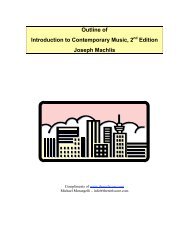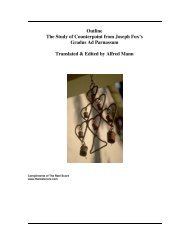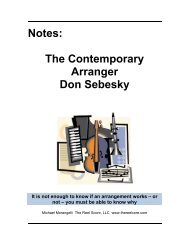An Outline of The History of Western Music Grout ... - The Reel Score
An Outline of The History of Western Music Grout ... - The Reel Score
An Outline of The History of Western Music Grout ... - The Reel Score
Create successful ePaper yourself
Turn your PDF publications into a flip-book with our unique Google optimized e-Paper software.
iii- Domenico Cimarosa (1749-1801)<br />
iv- Nicola Logroscini (1698?-1765)<br />
v- Baldassare Galuppi (1706-1785)<br />
d) France<br />
1: French version <strong>of</strong> comic opera called operà comique beginning around 1710<br />
as a lowly form <strong>of</strong> popular entertainment put on at parish fairs<br />
i- until middle <strong>of</strong> the century the music consisted almost entirely <strong>of</strong> popular<br />
tunes (vaudevilles) or simple melodies imitating such material<br />
ii- visit <strong>of</strong> an Italian comic opera troupe to Paris in 1752 stimulated the<br />
production <strong>of</strong> operà comique which introduced mixed Italian-French style<br />
original airs (called "ariettes") along with the old vaudevilles<br />
iii- by the end <strong>of</strong> the 1760's all the music was freshly composed<br />
2: with its alteration <strong>of</strong> spoken dialogue and musical numbers it flourished<br />
throughout the Revolution and the Napoleonic era<br />
3: Querelle des bouffons (1752-1752)<br />
i- sparked an opera performance <strong>of</strong> Omphale by Destouches which led to an<br />
invitation to Italian troupe who performed Pergolesi's intermezzo La serva<br />
padrona<br />
ii- a pamphlet war between partisans <strong>of</strong> Italian Opera and French Opera - with<br />
Jean-Jacques Rooussiau (1712-1778) as one <strong>of</strong> the Italian Faction leaders<br />
iii- basically over the suitability <strong>of</strong> the French language for song<br />
4: Opèra Comique<br />
i- used spoken language instead <strong>of</strong> recitative<br />
ii- following the European trend in the second half <strong>of</strong> the century, it dealt boldly<br />
with the social issues that were agitating France during the pre-revolution<br />
years<br />
5: Composers<br />
i- Christoph Willibald Gluck (1714-1783)<br />
ii- Jean-Jacques Rousseau (1712-1778)<br />
iii- François <strong>An</strong>dré Danican Philidor (1726-1795)<br />
iv- Pierre-Alexandre Monsigny (1729-1817)<br />
v- <strong>An</strong>dré Ernest Modeste Grètry (1741-1813)<br />
e) England<br />
1: Ballad Opera<br />
i- popular after the extraordinary success <strong>of</strong> the Beggar's Opera in London in<br />
1728<br />
ii- consists <strong>of</strong> popular tunes - usually ballads - with a few numbers which<br />
parody familiar operatic airs<br />
2: immense popularity <strong>of</strong> ballad operas in the 1730's in England signaled a<br />
general reaction in England against foreign opera<br />
3: Composers - only notable composer <strong>of</strong> English opera in the 18th century was<br />
Thomas Augustine Arne (1710-1778)<br />
f) Germany<br />
1: <strong>The</strong> success <strong>of</strong> the Ballad opera inspired a revival <strong>of</strong> Singspiel (popular since<br />
the 16th century)





